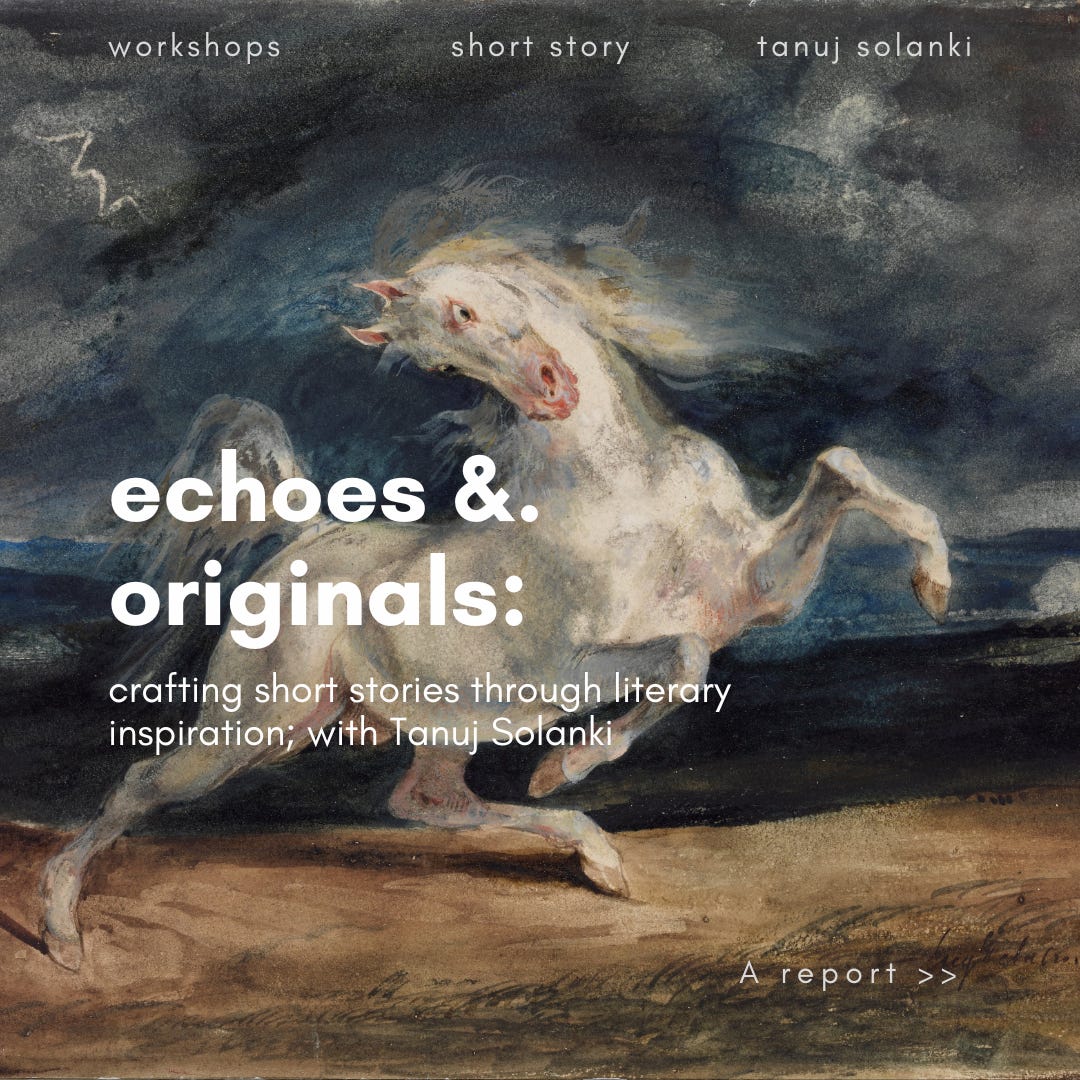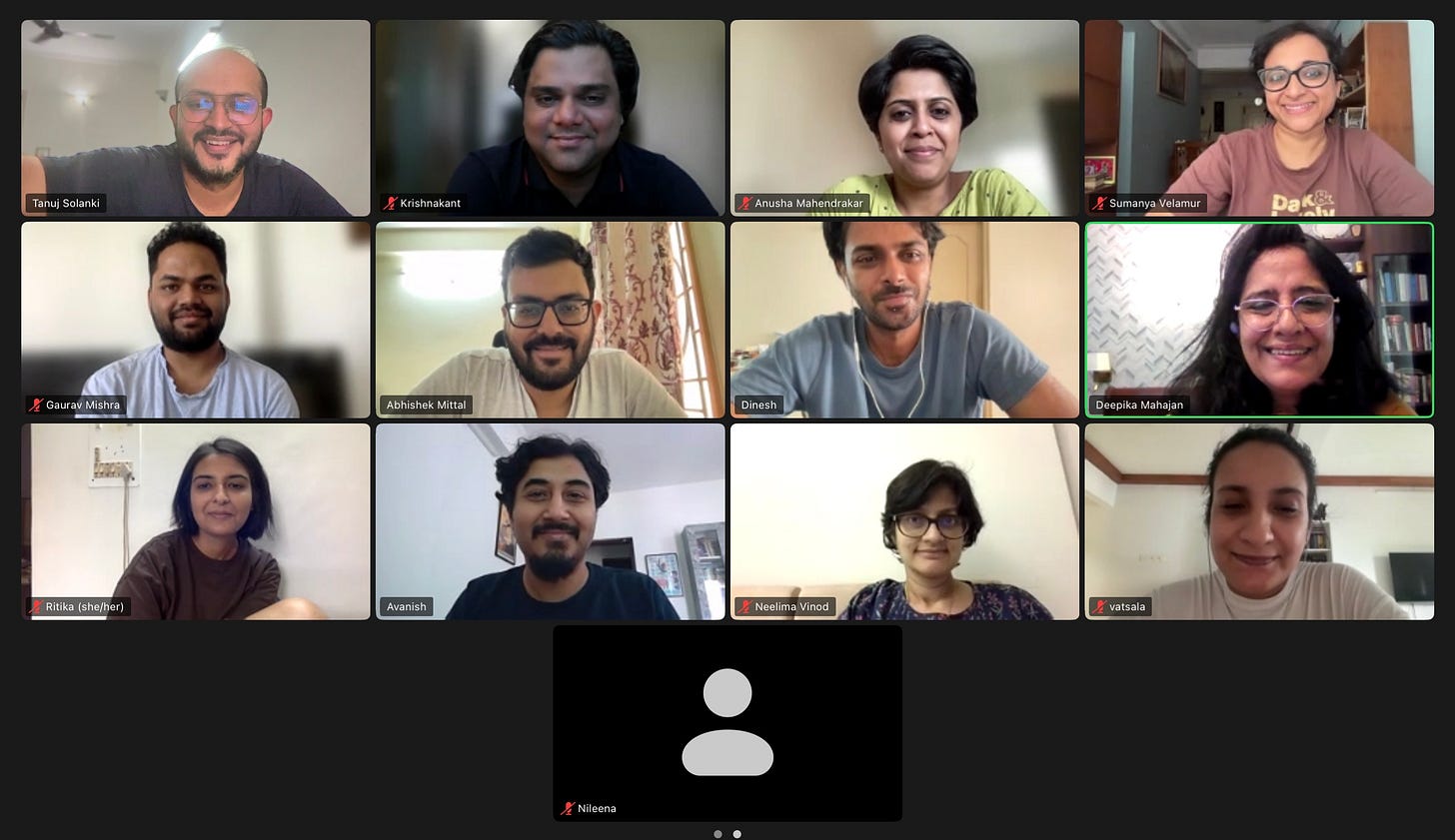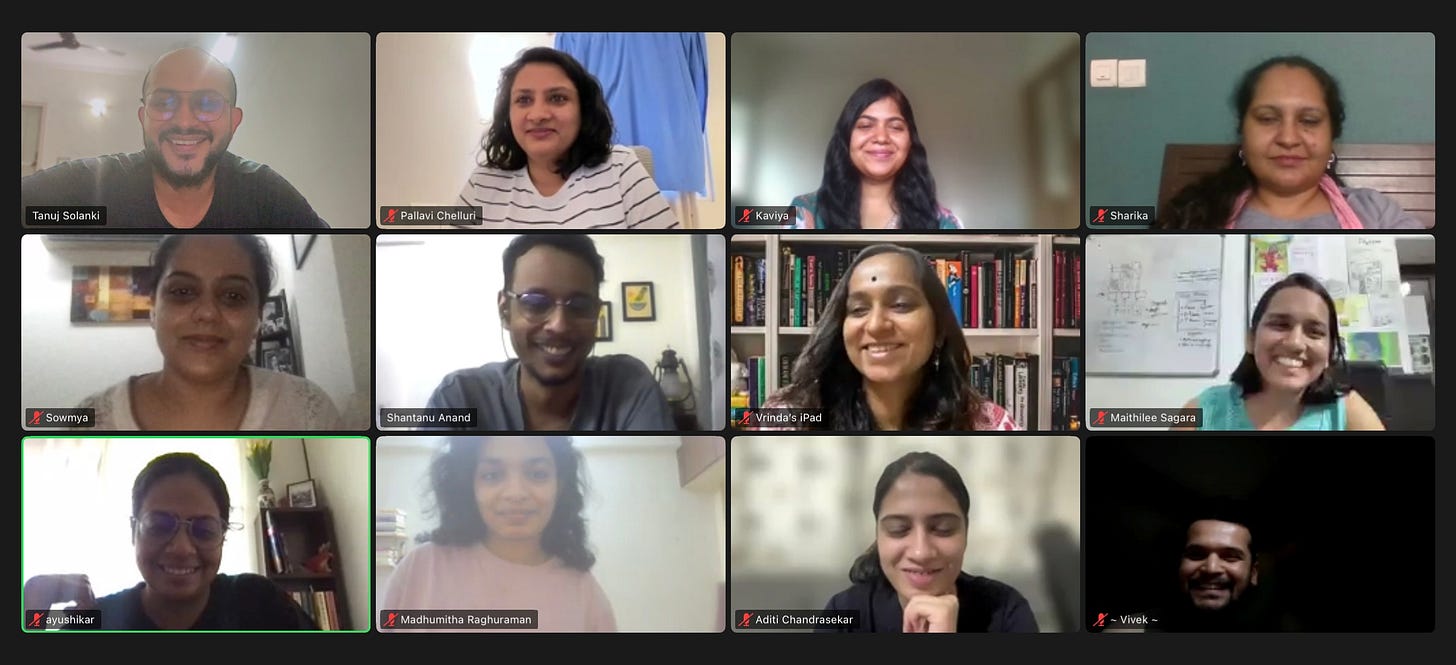echoes & originals: from season 2
The short-story-writing program I launched in November 2024 concluded its second season, for new and repeating participants, yesterday. Here’s a report…
In early October 2024, I announced a short-story-writing program for those interested in working with the form. Four three-hour classes on consecutive weekends, assigned readings for every class, and an ask to write a short story over and after the program duration. I have written about the initial program response and my thoughts before launching the program here.
In February 2025, I announced a new season of the program: for new participants, with minor adjustments in material used in the earlier classes; and for those who wanted to repeat the classes with different (and different kinds of) stories. Classes for three of these batches, with forty-five participants in all, ended yesterday. It was, once again, a delightful experience for me, and more importantly, as gleaned from the feedback that is now trickling in, for the participants too.
In weeks 1-4, one of the grounding thesis for the classes was the idea that stories are concerned with change (in a person or persons), that a hefty subset of short stories begin with setting up the premise for such change, and that one of the most natural ways to change a person’s circumstance is to change their location from place 1 to place 2. Among these spatial changes, some have unique thematic valence; for example, a person may find themselves in a narrative of return or repose. Taking this view, we arrived at categories like ‘the homecoming story’ or ‘the vacation story’, examples of which were part of the reading material.
For those attending the classes for the second time—weeks 5-8, that is—my challenge was to take things to a new elsewhere, both in reading material and insight. I thought it would be useful for the settled truths of the first four classes to be challenged and contradicted. The stories in the second round—I’m calling it le deuxieme mouvement—could be about the upsetting of change; in extreme cases, they could even catch characters past the possibility of change, or past irrevocable change. Here’s one of the key theses we explored:
If spatial movement is one of the ways in which short stories set up the mechanics of change (significant, complex, intriguing), then thwarted / delayed / painful / expensive / loopy spatial movement is thwarted / delayed / painful / expensive / loopy change.
Here, unlike in the stories from week 1-4, our concern is not what happens to protagonists after they briefly go ‘home’, or what happens to them during their vacations, but on the sites and modes of absurdity that exist in the journey, and how ridiculous they render the thematics of homecoming and repose, how enfeebled they leave agency and motivation, and how they turn the narrative from its predilections for change to a certain acceptance, on behalf of the main person or persons, of stasis, futility, submission, wonder / horror, or just plain madness.
Absurdity and stasis being major concerns, it was perhaps inevitable that Kakfa became a key part of the syllabus in le deuxieme movement. Later, we also looked at ways to include our personal politics, and a wider awareness of politics as it pertains to communal life, into our fictions. On the technical side, this led to exploring fragmentary writing with its powers of polyphony, discreteness / discontinuity, and its utility as a way to include ex-narrative text (eg., a letter, an email, a Wikipedia entry, found or invented knowledge etc.) into narrative.
I am taking a small break from echoes & originals to focus on my own writing. I plan to offer the classes again sometime in September. Those interested may fill the registration form, and I will write to you when things begin to firm up.
Testimonials from some of those who attended week 5-8, le deuxieme mouvement:
I didn't think le deuxieme mouvement would be too different from weeks 1-4 except for longer stories but I was blown away with Tanuj's choices of reading material, the surgical precision with which he helped us dissect and comprehend the craft of superior storytelling, absurd writing, new forms...and the tough assignments that were perfect to take a leap into the higher plane of writing! This Season was terrific and a natural progression to Season 1. Thank you! I am changed as a reader, writer and editor forever.
Arpita Bhawal
I attended the first round of e&o, which built my fundamentals in literary craft. Tanuj taught us how to read like a writer, the lens to use while analysing a story, and the methods of writing with clear examples. In the second season, as we moved into more advanced and unfamiliar territory, his uniquely structured way of teaching kept us just as anchored as we were in the first. He makes writing feel accessible in a way I’ve never seen before. With his insights, deep understanding of the craft, and ability to break things down for writers in a meaningful manner, this is hands down one of the best writing courses I’ve taken.
Mounica Sarla
I loved e&o, le deuxieme mouvement, because it expands the analysis of short stories from what we learnt in the first round. It helps you learn how to spot authorial intent with greater clarity. The learning is cumulative, especially because it goes beyond the story to touch upon other aspects that inform a writer: personal politics and writing with socio-cultural sensitivity. Le deuxieme mouvement also goes beyond realism to look at other genres: absurdist, speculative and surreal.
Suchitra Sukumar
Testimonials from some of the first-timers who attended the first round, week 1-4
Enrolling in echoes & originals is perhaps one of the best decisions I have taken in service of my lifelong dream to write fiction. Until now, the idea of attempting fiction felt as elusive as it was alluring. However, by peeling off the mystique and romance attached to the act of writing fiction, Tanuj had made it feel not just within reach, but has equipped me with tools to write believable stories, that can be published. I especially enjoyed Tanuj's straightforward and grounded approach to facilitation. I won't be exaggerating if I say that I have started looking at the world from a lens of stories since I attended the course.
Ritika Chawla
I signed up for Tanuj's echoes and originals after having faced a lot of rejections for my writing. I may still face rejections, going forward, they are after all unavoidable while starting out as a writer. But, I am confident that I will be able to analyse and edit my drafts better, experiment more and maybe write a story that I am really proud of.
Vrinda Varma
echoes & originals offers a clinical post-mortem of the short story form, providing an anatomical insight into its functions. Whether you're a writer seeking strategic tools or simply a reader who appreciates the form, Tanuj's analysis is invaluable. A recommendation for EVERY short story enthusiast.
Anusha








Tried to be original in drafting an anlaogy, as learnt. :)
I was lucky to to be part of Tanuj's recent cohort. To me Tanuj is like a light bulb wielding traffic cop, who tries his best to show you the best roads in your journey to writing and also which potholes to avoid. His ability to deconstruct a piece of writing is phenomenal. You will come away more aware as a reader, writer or a life spectator analysing human behaviour. Go for this one!